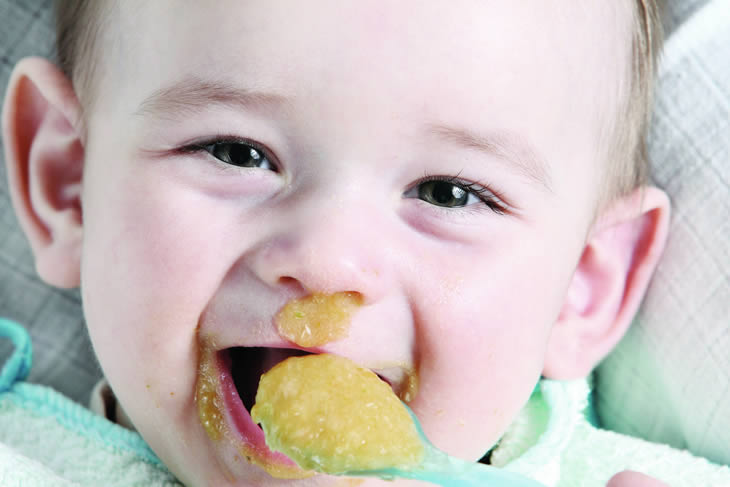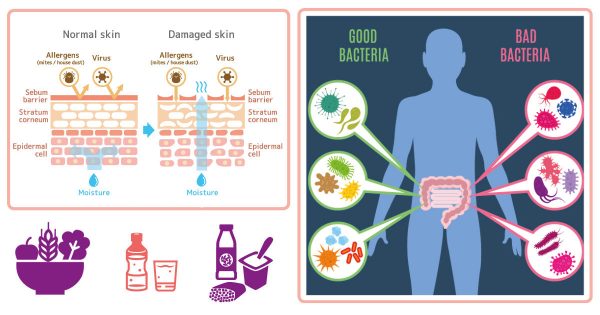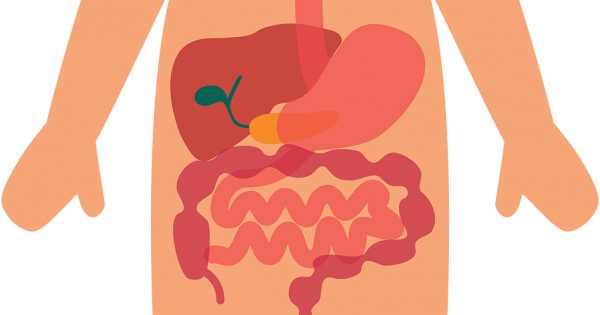Your baby’s poop tells a great deal about the state of his digestive health. Characteristics such as the colour, consistency and texture of his poop will give you a fairly good idea about what’s going on in his digestive system. These characteristics are largely influenced by your baby’s diet and environment. Monitoring his bowel movements will help you assess and address any potential problems your baby may face quickly and effectively.
The scoop about baby poop
Your new-born’s first poop usually appears within the first 24 hours of birth. The greenish-black tar-like stuff you will see in his hospital nappies is called meconium. It is made up of the stuff your baby collected in his intestines while in the womb – including old blood cells and skin cells, giving it its rather unusual appearance.
Two to four days later, you should notice a change in the colour and consistency of his poop. They tend to be green and less tacky than meconium. This is a good sign as it shows that your baby’s intestinal tract is in good working order.
From day four onwards, the type of food your baby eats (including breast milk, formula and eventually, solid foods) will determine the colour, consistency and frequency of his poop.
In general, baby’s stools tend to be softer and looser compared to an adult’s. The biggest change in your baby’s poop will come when you start him on solids (usually from six months old onwards). As your baby progresses onto a variety of solid foods, his stools will become thicker, darker and a lot smellier!
What’s normal, what’s not?
Baby poop comes in many shades and consistencies, and even the most experienced of parents may not have seen them all. Colour change can occur as a result of his diet or additives in food. For example:
Yellow: By about five days after birth, breast-fed babies usually have seedy, loose bowel movements that are yellow to yellow-green or tan in colour.
Brown: If you feed your baby formula, his or her bowel movements might become light brown and pasty.
When to worry?
Black, white or red coloured poop can signify a problem with your baby’s digestive system.
Black poop can occur from consuming certain foods or supplements. However, if poop is tarry black, there may be ‘old’ blood in the digestive tract that has turned dark black as it travels down the intestines. Ulcers in the oesophagus or stomach (known as gastritis) can cause bleeding in the digestive tract and cause poop to turn black.
Black poop can also result from medical conditions such as bowel ischemia (a reduction of blood flow to the intestines), vascular malformation (misshapen blood vessels) or varices (large protruding veins in the oesophagus).
White, grey or pale poop is abnormal and can mean a liver problem, or perhaps a problem with the pancreas, gall bladder or intestines. There could be blockage of bile flow or intestinal malabsorption.
For example, biliary atresia is a condition that is charaterised by the absence of malformation of the biliary drainage system outside the liver, and typically presents with jaundice and pale stools.
Chronic intestinal infections can result in intestinal malabsorption and present with bulky and pale faeces in babies.
Red poop can be caused by beets, tomato juice and colouring in food but blood in the poop is abnormal. If your baby’s poop appears dry and hard, with traces of blood, it could mean that he is constipated and the hard stools have caused tiny tears in the skin of his anus (anal fissures).
If there is a lot of blood in the stool of your baby or child, he could be having a severe intestinal problem such as intussusception (intestinal blockage). Bright red blood in the toilet bowl or darker blood mixed with stool may also indicate the presence of inflammation in the gut which can be caused by infection or inflammatory bowel disease (IBD).
Meanwhile, poop that is oily could mean a change in diet, intestinal malabsorption or a pancreatic disorder. Stool that floats and is buoyant may be caused by fat malabsorption resulting from episodes of diarrhoea or other gastrointestinal infections.
Don’t worry too much
Finding inconsistencies in your baby’s excretions may cause alarm. However, parents should not be too worried or immediately jump to conclusions.
For one, bowel movements usually say more about the previous day’s menu than a looming disease. However, if a symptom persists, or if your baby isn’t gaining weight like he should, promptly seek the advice of a medical professional or a paediatrician.
Guarding your baby’s gut
Baby’s digestive system can impact his overall health. Here are some ways you can help safeguard or maintain your baby’s digestive system:
Practice breastfeeding: Breastfeeding your baby during the first weeks and months of his life can boost up his immune protection while ensuring a healthy balance of good bacteria in your baby’s gut. Breast milk contains antibodies that will line your baby’s gastrointestinal tract and protect him from potentially harmful antigens in his immediate environment. In addition to improving your baby’s immunity, breast milk provides your baby with a balanced nutrition that is specially tailored to your baby’s needs.
Avoid excessive use of antibiotics: Avoid giving your baby any antibiotics unless medically necessary. Antibiotics can disrupt the balance of your baby’s gut micro-flora. If medications are necessary, always maintain close communication with your doctor.
It may not be the best thing to discuss over dinner, but poop is a useful indicator of what is happening with your baby’s digestive system. Remember that a healthy baby is a happy baby, and his journey toward the path of optimal growth and development begins with you.








Comments